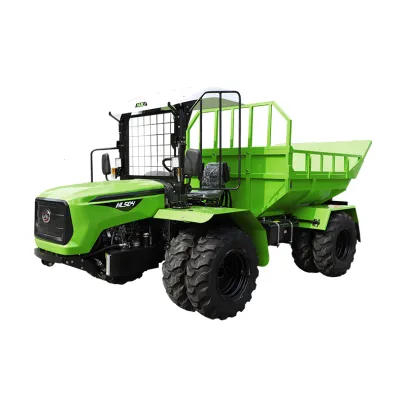An articulating tractor, also known as an articulated tractor or simply an "articulated," is a type of agricultural tractor characterized by its unique design that allows for greater maneuverability. Unlike conventional tractors with a rigid frame, articulated tractors feature a pivot point between the front and rear sections, allowing them to articulate or bend in the middle.
Key features of an articulating tractor include:
1. Articulating Joint:
The tractor consists of two main sections connected by an articulating joint, which is typically a pivot point located in the center. This joint enables the tractor to bend or articulate, providing greater flexibility when navigating tight turns or uneven terrain.
2. Steering Configuration:
Articulating tractors usually have a steerable front section. This means that the front wheels can turn independently from the rear section, allowing for a sharper turning radius. The steering configuration contributes to the tractor's ability to navigate through narrow spaces and around obstacles.
3. Improved Maneuverability:
The articulating design enhances maneuverability, making these tractors well-suited for tasks that require navigating around obstacles, such as trees or tight corners in fields. This feature is particularly beneficial in confined spaces where a conventional tractor might face limitations.

4. Stability on Uneven Terrain:
Articulating garden tractors often exhibit good stability on uneven or hilly terrain. The ability of the tractor to flex in the middle allows each section to adapt to the contours of the ground independently. This can be advantageous when working on undulating landscapes.
5. Power and Versatility:
Articulating tractors are known for their power and versatility. They are commonly used in various agricultural applications, including plowing, tilling, planting, and towing implements. The articulated design enables efficient operation in diverse farming conditions.
6. Articulation Lock:
Some articulated tractors come equipped with an articulation lock. This feature allows the operator to lock the front and rear sections in a straight line for highway transport or when a rigid frame is preferred for certain tasks.
7. Cab Design:
The cab of an articulated tractor is often positioned on one side of the pivot point, providing the operator with a clear view of both the front and rear sections. This visibility is valuable for precise maneuvering and operation.
While articulated tractors offer distinct advantages in terms of maneuverability and flexibility, they may have a steeper learning curve for operators accustomed to traditional tractors. However, their unique design makes them a preferred choice in specific agricultural settings where tight turns and efficient navigation are essential.





Comments
0